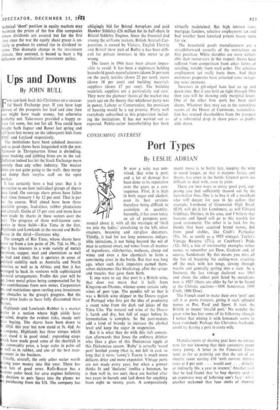Ups and Downs
By JOHN BULL
E-1 EW can look back this Christmas on a success- "- ful Stock Exchange year. If you have kept breast of the prospects for lead and zinc then you might have made money, but otherwise probably not. Take-overs provided a happy re- lease for some, but not for all. You could have bought both Jaguar and Rover last spring and still have lost money on the subsequent bids from BMC and Leyland respectively.
The institutions have been subdued investors nd so good shares have languished with the rest. Turnover in Throgmorton Street is dwindling. Some broking and jobbing firms are in the red. eflation indeed has hit the Stock Exchange more verely than any other industry. The weaker mis are not quite going to the wall: they merge nd dump their surplus staff on the open arket.
It has certainly been a bad year. But it is structive to see how individual groups of shares ave fared. On average share prices have fallen ack since January 1 by 12 per cent. That is par or the course. Well ahead have been three pecialist groups, lead-zincs, rubber plantations nd aircraft. Gains of 15 per cent and more have en made by shares in these sectors over the ear. The progress of three well-known corn- anies in these fields—Rio Tinto in the first, *ghlands and Lowlands in the second and Rolls- oyce in the third—illustrates why.
The strength of Rio Tinto, whose shares have me up from a low point of 29s. 74{1. to 39s., is at it has interests in a wide variety of metals uranium, copper, steel and aluminium as well s lead and zinc), that it operates in areas of olitical stability such as Australia and North merica as well as in Africa; and that it has anaged to back its ventures with sophisticated nancial arrangements. Profits this year will be p, lower metal prices being compensated for by rst contributions from new mines. Corporation x and restrictions upon sterling area investment re obstacles to the group's progress. But the are price looks to have fully discounted these ctors.
Highlands and Lowlands Rubber is a market ader in a section whose high yields have ttracted, despite the evident risks, steady unit ust buying. The shares have been down to . 104d. this year but now stand at 3s. 41{1. As company, Highlands has three virtues which ve stood it in good stead: expanding crops hich have made good some of the shortfall in e commodity price, a large stake in palm oil well as in rubber, and one of the best man- ments in the business.
Finally, aircraft, the only other sector worth sting your money into this year. There has en lots of good news. Rolls-Royce has a onster order book for aero engines following e decision to puts Speys into the planes we e purchasing from the US. The company has obligingly bid for Bristol Aeroplane and paid Hawker Siddeley f26 million for its half-share in Bristol Siddeley Engines. Since the financial dud among the airframe makers, British Aircraft Cor- poration, is owned by Vickers, English Electric and Bristol (now part of Rolls) it has been diffi- cult for private investors in this sector to go wrong.
The losers in 1966 have been almost impos- sible to avoid. It has been a nightmare holding household goods manufacturers (down 26 per cent on the year), textiles (down 22 per cent), stores (down 18 per cent) and building materials suppliers (down 17 per cent). The building materials suppliers are a particularly sad case. They were the glamour shares of the market two years ago on the theory that whichever party was in power,. Labour or Conservative, the provision of housing would be a top priority. Pretty well everybody subscribed to this proposition includ- ing the institutions. It has not worked out as expected. Public-sector housebuilding has been virtually maintained. But high interest rates, mortgage famines, selective employment tax and bad weather have knocked private house starts for six.
The household goods manufacturers arc a straightforward casualty of the restrictions on hire purchase. White durables are more vulner- able than motor-cars in this respect. Stores have suffered from competition from other forms of retailing, notably from mail order. The selective employment tax really hurts them. And their enormous properties have attracted some swinge- ing rates increases.
Investors in gilt-edged have had an up and down time. But if you held on right through 1966 then you will be showing only marginal losses. One of the other firm spots has been steel shares. Whatever they may say in the committee rooms of the House of Commons, nationalisa- tion has rescued shareholders from the prospect of a substantial drop in share prices as profits slide down.






























 Previous page
Previous page